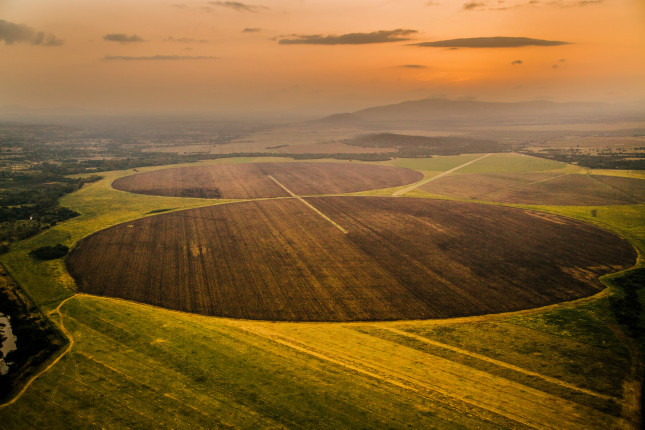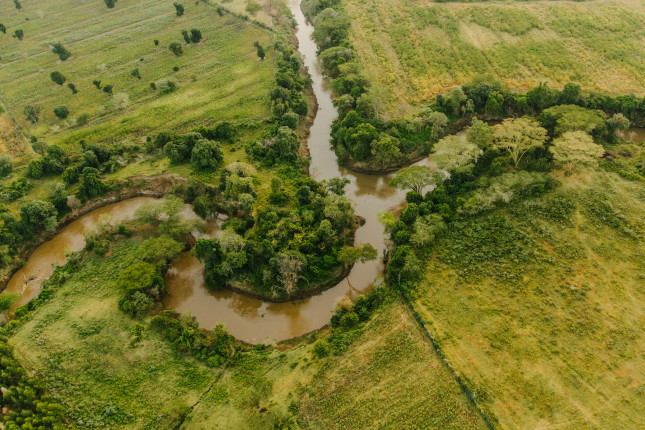-
Enhancing Water Security and the Role of Diplomacy in Africa’s Mara River Basin and Beyond
March 9, 2020 By Ladeene Freimuth
The Mara River traverses nearly 14,000 kilometers in Kenya and Tanzania, flowing through the Masai Mara National Reserve in Kenya and the Serengeti National Park in Tanzania. It is a vital water source for more than 1 million people in the area, as well as for 2 million zebras and wildebeests. In fact, the Mara River Basin is “one of the most ecologically important basins in the world,” according to Basil Mahayni, Deputy Director of USAID’s Sustainable Water Partnership’s (SWP). Communities in Kenya and Tanzania depend on the Mara River Basin for a variety of needs, including drinking water, livelihoods, and ecosystem preservation. Therefore, water security in this basin is essential to ecological health of the basin and its wildlife and the region’s economic development.
Because of the nature of the threats facing the basin, its importance, and the collaborative approach used, the Mara River Basin has been an ideal candidate for a Sustainable Water Partnership demonstration project. While many transboundary water management challenges and solutions are unique, some common factors and lessons often can be applied across basins. Thus, not surprisingly, issues and solutions can be drawn from the Mara Basin effort and applied to other basins in the region and around the globe.
Population growth, deforestation, and unsustainable agricultural and land use practices threaten the Mara River Basin. Global climate change is resulting in a more varied distribution of water supplies, as Ken Conca, a noted water resource and environmental peacebuilding scholar, and Professor of International Affairs for American University, noted at a November 2018 Wilson Center water security event. These impacts lead to greater uncertainty and complexity for managing water resources and fostering water security, particularly across political boundaries.

Upstream Downstream Dynamics
Upstream water uses and management practices (whether positive or adverse) often can cause downstream impacts. In the Mara Basin, illegal and improper logging and harvesting in the Mau Forest, as well as prior threats of building a dam for hydropower in the upper portion of the river, have severe downstream impacts. In addition, Kenya, as the upstream country, has a political advantage. It controls the water supply flow to its downstream neighbor, Tanzania, and can leverage its power accordingly. Meanwhile Tanzania depends on Kenya for this vital resource to survive. Such situations, particularly with disproportionate power and political conditions, can be the source of tension between neighboring countries.
To help solve these problems, the Mara Basin Project adopted a multipronged approach. Various partners work with local stakeholders to deploy common data sets and modeling tools to develop water allocation plans, first within Kenya and Tanzania individually, then basin-wide, facilitated through oversight and management by the Lake Victoria River Basin Commission.
The water allocation plans recognize the political reality of the upstream/downstream situation between Kenya and Tanzania and are intended to offer a flexible framework to enable the countries to address their individual and collective current and future water situations. More specifically, they serve as decision-making tools to ensure Kenya preserves enough water to meet its “basic human needs” and ensure adequate water exists for environmental sustainability needs, among other purposes. The plans also help Kenya allocate sufficient water to Tanzania to meet these human health and other needs.
Bridge to Diplomacy
Historically, there has been greater cooperation than conflict over shared water resources. Additional contributing factors include: the degree of political leadership and will, the strength of the basin countries’ respective institutions, and the nature of the power balance between the neighboring or riparian countries.
Common assumptions, data sets, and water resources planning models in SWP’s Mara Basin activity also provide a bridge to diplomacy and negotiations, which are especially vital to facilitating cooperation over transboundary water resources, ultimate adoption of the Mara Basin water allocation plans, and greater water security. To improve the likelihood of achieving these goals, the Mara Basin water allocation plans will not be “static documents,” according to SWP Director Rodolfo Camacho. They are meant to be updated periodically to reflect changing conditions and new data. Outside stakeholders and institutions also are engaged to advance the water allocation planning process and ultimate implementation.
While the lessons learned are not necessarily all new, successfully applying those that are appropriate, requires attention, and building and transferring capacity among transboundary neighbors. Newer to the scene, innovative technologies and tools could be “game changers” in helping address various water resource-related challenges. Artificial Intelligence (AI) and other technologies can help aggregate data to better inform water allocation and management strategies and can facilitate near- and longer-term resource cooperation, as one major technological advancement. As another example, desalination continues to dramatically improve the water situation in the Middle East. However, technology alone will not solve the transboundary water resource challenges identified herein.
Significant experience has been acquired to date to facilitate greater water security through models of transboundary stakeholder diplomatic cooperation and important lessons learned, in this instance, in the Mara River Basin. These factors, combined with emerging technologies and capabilities, political will, and leadership among relevant local, national, regional, and global stakeholders will ultimately help advance a cross-sectoral, solutions-oriented, cooperative, transboundary strategic water security agenda in the Mara River Basin, and that could serve to enhance water security in other parts of the globe, as well.
Other articles in the Water Security for a Resilient World highlight the connections between water and food security; the need to integrate women into water management; using data to improve water security; the opportunity for innovative financing to expand access to water; water as a tool for resilience in times of crisis; engaging communities to increase water point functionality; how citizen science can enhance water security; the role of innovative technologies in water security; water and livelihoods in the Mara River Basin; the hidden forces of water in economic prosperity; and the challenges and opportunities of too little water, too much water, dirty water, and unpredictable water.
Ladeene Freimuth is President of The Freimuth Group, a domestic and global energy and environmental consulting firm. She previously worked in the U.S. House, Senate, Executive Branch, and private sector. Overseas, she worked on global women’s and transboundary water management projects.
Sources: “Basins at Risk: Conflict and Cooperation over International Freshwater Resources,” Ph.D. dissertation by Shira Yoffe; No Water No Life; Serengeti-Lake Victoria Sustainable Water Initiative; Sustainable Water Initiative; Sustainable Water Partnership; USAID; World Wide Fund for Nature.
Lead Photo Credit: The Mara River Basin. Photo by Bobby Neptune for Winrock International. © 2018
 A Publication of the Stimson Center.
A Publication of the Stimson Center.




